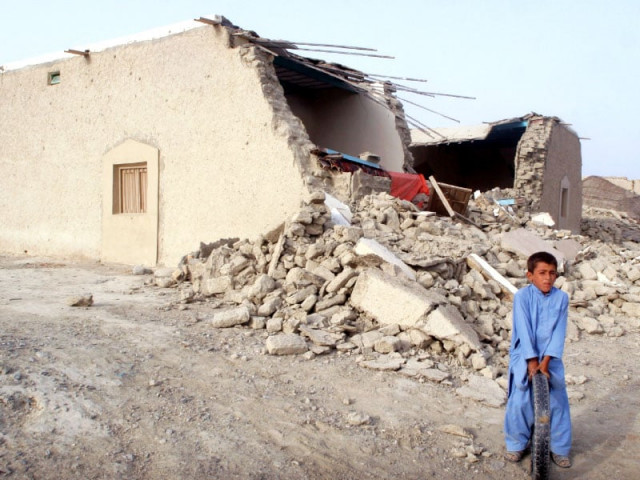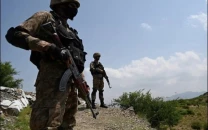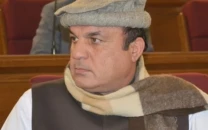From the ruins of Awaran: ‘Angry, hungry and helpless’
The Express Tribune witnesses devastation, as well as indifference by some as the visit concludes.

While the Military Headquarters in Awaran is flooded with relief goods pouring in from around the country, there are still quite a number of places no far from the base which fail to grab the attention of the authorities. PHOTO: ATHAR KHAN/EXPRESS
As the roads ‘disappear’, I realise I am close to Awaran tehsil, the centre of all the earthquake relief activities.
I see more trucks passing by, some empty, some laden with tents and sacks of food.
Shops begin to appear – and so do their damaged structures. However, life and business continues in Awaran tehsil.
This central area of the small town is built in such a way that shops line either side of the dirt pavement, while the houses are constructed behind the market. Only a couple of structures are more than one storey high. All except one building is made of cement, the rest are made up of ochre mud and stone.
I only see men on the streets, sitting at PCOs or at shops that sell groceries, vegetables, and Irani petrol.
The sound of helicopters drowns all other noise. We draw nearer to the source of the sound and find ourselves outside the Military Headquarters, Awaran – the army’s helipad is on the opposite side.
Our cars turn inside the base. Several DSNG vans of the leading television channels are parked beside the mosque inside. There are clusters of cameras, mics and dozens of journalists – men – everywhere. A former Sindh MPA is the only woman besides me at the entire base.

I speak to my colleagues to plan the coverage, but I can’t help but notice the stares I’m getting. Some officers ask me to sit inside the base comfortably. “But I’m working,” I insist. “Madam, please. It doesn’t look nice,” one of them says.
However, I am saved by the Sindh chief minister’s car. As his protocol turns into the military headquarters, everyone gets into position. The SUVs swagger in, Sindh Chief Minister Qaim Ali Shah, along with his Baloch counterpart, get out of their vehicles, meet with journalists and go in a room for an army briefing.
After the 15-minute briefing on earthquake disaster assessment, where the army assessed the death toll to be at 303 (the media was reporting 356 that day), the Balochistan chief secretary welcomes Sindh’s support. The chai and biscuits arrive.
The chief ministers step outside and address the dozens of media men present. The short chief-ministerial visit is over. Sindh CM Qaim Ali Shah leaves after a helicopter ride over some of the quake-ravaged areas.
Before it gets dark, my colleagues and I drive over to the village of Labach, two miles from the military headquarters. The short distance takes us nearly 30 minutes to cover as we drive through a dried-up stream first, and through heaps of sand next.
A pick-up van with coolers, food and other relief goods is accompanying us. As we approach the village, I see a few men glaring at us, they look infuriated. Men and children of Labach surround our car and the truck as we turn off our engines. The angry crowd kicks the car, the men thump their fists on the windows.
An Awaran government official with us in the car gets out and calms them down. A man grabs his collar, but he keeps his cool. He pats his shoulder and explains to him who we are in Balochi. Suddenly, the men yank our car door, but only to welcome us. One of them, Ahmed, points us to the village. He asks me to go talk to the women.
I see why the villagers are angry. Everything they have is destroyed. The women I speak to pull me over to see their house that stands no more. Rocks that made up a house are scattered. Broken sections of roofs are hanging off a house, resembling a branch dangling off a tree. Another house, belonging to Rashida, is completely caved in.
“We have nothing left,” says Rashida, her grey eyes glistening with tears. Her nephew had died in the earthquake. “We didn’t even have kaffan (shrouds) to bury our dead, we used our women’s dupattas.”
Seeing that I am disappointed, Rashida brushes my head with her hand and apologises for the ‘ruckus’ created by the men of the village before. “They’re angry, hungry and helpless,” she says. “What do you do about food?” I ask. We borrow whatever food we can from nearby villages, she responds.
We distribute the little food, coolers and other relief goods in the truck. That was the first kind of relief Labach had received.
The eight other villages we visit have the same problems, the same complaints, and the same looks of disdain and dejection. They have no shelter, no food, no hope and, for some, no future.
I gaze at the spectacular mountains of Awaran as we drive back to Karachi. I see the simplicity and beauty of the landscape and of its people juxtaposed with their hardship and lives of destitution. Will the survivors ever be able to recover from such a calamity?
I snap out of it, sit up straight and look ahead. The roads have reappeared.
Published in The Express Tribune, October 4th, 2013.



















COMMENTS
Comments are moderated and generally will be posted if they are on-topic and not abusive.
For more information, please see our Comments FAQ